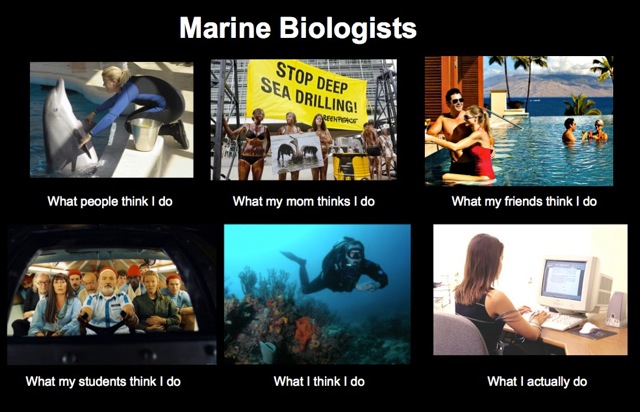
Here at DSN we strive to inspire the next generation of mini-deeplings. Ultimately, we want you to want you to be like us. Perhaps not the more delinquent side of us, but definitely the better half of us that constantly questions, investigates, and stands in awe of our blue planet.
With that, we often get e-mails from the mini-deeplings asking how do we do what we do. We LURRRVE talking to them and answering all their questions about how to become marine scientists, oceanographers, conservationists, pirates, and such. Quite regularly however, they ask many of the same questions. Therefore, to avoid the department of redundancy department and make sure you each get well thought out, comprehensive answers, we decided to compile the 20 most frequently asked questions. Feel free to use these to help guide you on your homework assignments, class work, and most importantly life work.
<DISCLAIMER> Marine Science is an overarching umbrella spanning numerous scientific disciplines. My hope is that these answers will help you along your path, but know that there are many MANY paths up the proverbial mountain. Our opinions come from our collective experience which in and of it self is extremely diverse. If you have any specific questions about certain topics not covered here, drop us a line and we will put you in contact with the people who can help you.
1. Have you always wanted to be a marine scientist?
Personally, I don’t remember a time when I didn’t want to. My parents were both divers and I wanted, as most children do, to be just like them. The day that PADI lowered their diving certification age, you best believe I was in on that. My first dive off the Channel Islands quite vibrantly changed my life. Till this day, I thank my dad for pulling me out of range of disgruntled moray eels and making sure I didn’t run out of air when I was too busy exploring, flipping over every. single. rock., and sticking my hands into caves, to care about anything important like that. At 13 years of age, I fell in love with the California kelp forest and all the amazing critters it held. Once I was old enough to realize that they ACTUALLY PAID people to frolic in the ocean, flip over all the rocks, and stick their hands into caves….it went without question…I had to be one of those people.
Though many in this field might have a similar story to this, not all marine scientists knew this was their thing from the get go. This is wonderful as they might bring a whole new prospective or skill set to the game.
2. What does a marine scientist do on a daily basis?
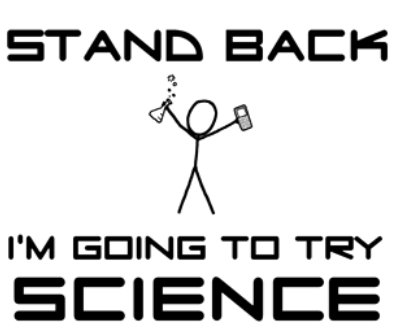 As with any job, this varies from day to day and at what stage of your career you are in. Those who work at universities or certain governmental agencies can often be found doing their research. Research may be carried out in the lab or out and about in field sites that span the globe. When not doing the actual “hands-on” science that you might think of, like creating epic paper machete volcanoes and such, marine scientists have to write grants to fund their research and papers that tell others in their field of their research findings. They also go to conferences and other universities to give presentations about their work. Professors at research universities may be required to teach and graduate students may also teach, as well as, take classes. Certain marine scientists even throw some outreach in the mix and involve the public in what they are doing. Yes, we are still talking on a DAILY basis here. As scientists we wear many hats and must balance a pretty substantial workload.
As with any job, this varies from day to day and at what stage of your career you are in. Those who work at universities or certain governmental agencies can often be found doing their research. Research may be carried out in the lab or out and about in field sites that span the globe. When not doing the actual “hands-on” science that you might think of, like creating epic paper machete volcanoes and such, marine scientists have to write grants to fund their research and papers that tell others in their field of their research findings. They also go to conferences and other universities to give presentations about their work. Professors at research universities may be required to teach and graduate students may also teach, as well as, take classes. Certain marine scientists even throw some outreach in the mix and involve the public in what they are doing. Yes, we are still talking on a DAILY basis here. As scientists we wear many hats and must balance a pretty substantial workload.
3. What is the best part about being a marine scientist?
If you ask me, I say playing with tons of algae and little invertebrates and going diving all the time. If you ask Dr. Bik, she loves playing on her shiny genome sequencing machines. Dr. Martini? Perhaps throwing big expensive equipment in the ocean to learn all about internal waves. (Heck, sometimes I have to force her to love squishy critters.) There is a different best thing for everyone, that’s what makes it awesome. However, I think something we can all appreciate equally is the ability to delve into the unknown and answer questions that further our knowledge of the world. The satisfaction of inquisition. That is hands down one of the best parts.
4. What is the worst/most challenging part?
I have yet to meet a scientist who enjoys grant writing. Spending months writing a document convincing “The Man” to give you money to do research….the research you often times can’t do without the money. Only to be up against pretty dismal odds that you will even get said money. It’s a pretty awful system. But sometimes, the planets align and the angels sing and by some stroke of luck and a bit of skill…You get the grant. Those days make it worth it.
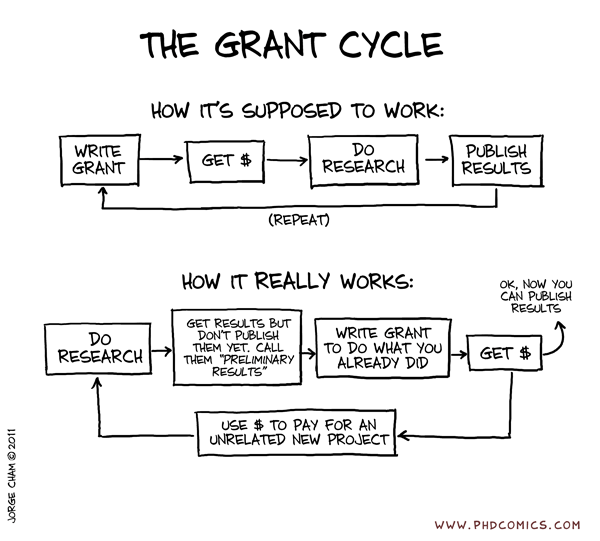
5. What classes should I take in high school?
Obviously, if your high school offers a marine science or environmental sciences course, take it. However, most schools don’t so then you go with: Foundations. Foundations. Foundations. Contrary to what one might think, marine science requires ALL of the other sciences. Chemistry, Physics, Math, and Biology. You can’t go wrong with doing well in any, if not all, of those classes. Other classes that you might not think beneficial would be computer programing, web development, and a solid writing class. Advance placement and college level courses are great too. If anything, these will prepare you for the workload you have to look forward to in college. Do not, however, underestimate the power of being a well-rounded student.
6. What colleges are good for marine science?
We get this question A LOT. However, I hesitate to answer with specific colleges that are good or are not good for marine science. There are many factors that should go into the decision of choosing a college that is right for you and what is good for you may not be good for me. Instead I recommend you have a serious conversation with yourself and discuss the following topics:
- How much are you willing to pay? This might factor in to whether you go in-state, out of state, out of country, etc.
- Does location matter to you? Remember you are going to spend 4-5 years of your life here. Being close to an ocean also helps.
- Do you want to do research as an undergraduate? Does this school have good faculty mentors?
- Are you set on having a degree specific to “marine science”? Aka you can still obtain the skills you need to be successful with other degree titles. Look into this.
- Do you want to study abroad? Is it easy to do this from your institution?
- Do they have a AAUS scuba diving program? This certification is required to dive at any university or governmental institution. If you want to dive. You need to ask this question.
- Do they have a marine lab? Is it close to campus/easily accessible? Do you have a way of getting there?
- Is it easy or hard to get classes? Are marine classes offered? How long does it take for students to get through the program?
From these questions (and hopefully you have your own list) find the programs and schools that best fit your criteria. Talk to students in the programs you are interested in to see what they have to say. If you are stubborn and still want a list of specific schools, this might be of use (Note: these are only the U.S. schools).
7. What is the cost of education/training?
This varies HIGHLY depending on two factors: Which universities you go to and how long you stay in school. For reference, I completed my bachelors in 4 years at a state school living on my own in a major metropolitan area. It cost me about $40,000 in total. For some, that is a single semester. This number will change drastically if you go to a private university or one that is out of state. From there you can continue on to a masters or doctorate degree depending on your career goals, but I would worry about that milestone when you get there. If you are in high school, start looking for scholarships. Contact the colleges you are looking at and ask them about their office of financial aid. Go talk to those people. They can also discuss financial planning with you. If you want it bad enough, you will find a way to make it work.
8. What classes should I take in college?
The required ones. Most programs have lists of the classes you have to complete to graduate…do those. I would recommend a solid core: Chemistry, Organic Chemistry, Biochemistry, Physics, Calculus, any of the Biological Sciences, Statistics (<-Do it. Learn it. Love it.). Beyond those: Bioinformatics, Programing courses, Scientific writing, Web design, Biological modeling (no…not that kind of Modeling…but just as fierce), Advanced statistics, Critical thinking courses (perhaps a Philosophy course or two). There are so many, but this a decent start.
9. What other training/education is required for this work?

Being a Marine Scientist requires a pretty extensive knowledge base. Most often you require at least a Master’s degree to be successful in this field, but it all depends on what you want to do specifically. The training I have had to acquire for my job spans from learning how to scuba dive (to collect my critters and make field observations) to learning how to extract the chemicals I use for my experiments. Contact someone directly in the field you are interested in to learn of any other specific training you might need. Now you don’t learn all of these skills at once, it is definitely a process and I am constantly acquiring new training and knowledge. It is one of the reasons I love my job. I am always learning.
10. I live in a land-locked state. Where can I find career building opportunities?
DSN’s own Dr. Miriam Goldstein compiled a nice list of internships and marine oriented escapades in the “So You Want to Be a Marine Biologist-Deep Sea News Edition.” Check the comments section too for even more opportunities. Insider scoop: The key to getting these often highly competitive gigs, is to start your applications early and have a million people read over them. Also, make sure you ask only the people who can give you strong letters of recommendation and allow them PLENTY of time to do it.
11. Are there other professional skills I should work on?
- NETWORKING IS EVERYTHING. The old saying, “It’s not what you know, it’s who you know” is so very true….except you also need to know a lot too.
- Though you might absolutely despise it, public speaking is also a necessary evil. If you aren’t good at it, get good at it. Despite being able to talk A LOT…I really dislike talking in front of large groups….so I have to practice…and practice….and practice. Often you will/should know more about what you are talking about than others in the audience…so show them that. You are not just a scientist, but a salesman too. So sell it.
- Leadership and time management skills are also beneficial in this field. As a scientist, you don’t often have anyone watching over you on a daily basis making sure you get your work done. There is usually just a bunch of deadlines. Thus, you are the one responsible for making sure the work gets done.
12. What is the salary range for a marine scientist?

Let me just preface this with most of us are not in it for the money. Marine Science is indeed a labor of love. With a Bachelors Degree you are looking at an average of about $20-40K a year. With a Masters Degree about $30-45+K. So on and so forth. This number is highly variably on what industry you might be able to find a job in. As a graduate student, your stipend depends on if you are a Masters or a PhD student and the cost of living in your area. This may or may not be supplemented by your professor’s grants. (NOTE: THIS IS DEFINITELY AN IMPORTANT DISCUSSION TO BRING UP WHEN YOU ARE LOOKING FOR SCHOOLS!!!!) In academia, assistant professors (those just starting out) make an average of $45-65K, whereas a full professor might make an average of $65-100K. With that said…there are very few of those jobs actually available.
For a more specific look at what one might make taking in to consideration background, location, and sector: SeaGrant Careers.
13. What is the average number of hours per workday?
Like I said before, as research scientists, we often dictate our own schedules. For me, how many hours I work a day depends on what time of the year it is. During the school year I try to keep it around 9-10 hours a day, hopefully no more than 5 days a week…but usually about 6. However, during the summer a.k.a. field season, all of that goes out the window. I work as long as it takes to get the research done. If that means I set up a tent at the marine lab…then I set up a tent…or build a fort…or something like that. Often times experiments do not run on normal human sleep schedules. This can make for very long hours and days. Usually, I just push through these with late night dance parties…and lots and lots of coffee.
14. Do you enjoy working with dolphins, whales, <insert other charismatic marine mammal here>?
Sad Alex is sad. I am going to let you in on a trade secret. Contrary to popular belief, we are marine scientists, not Seaworld trainers. (Rule #1. READ NOW.) I work with algae and snails and little invisible chemicals. Yes, I do enjoy it and think it’s one of the coolest things ever…that’s why I study it. No, I do not play with whales and dolphins. No, I do not want to. If whales and dolphins are your thing, that is awesome!! I know about two people who work with them and this is often how that goes….
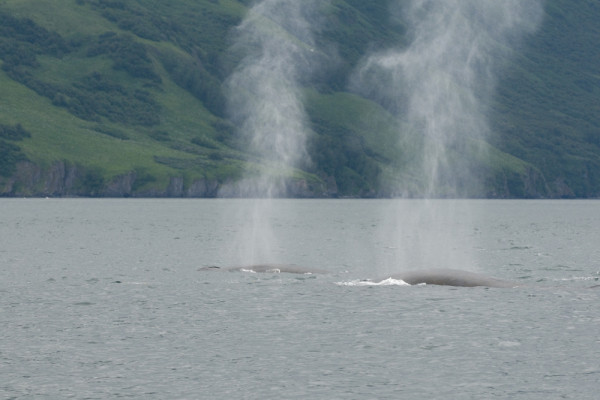
…you want to do that too….by all means. We need people like you.
15. What types of jobs are available?
The ocean is really the limit here. You could work in anything from academia (being a researcher or a professor), to government (either policy or regulation), to non-governmental agencies (research, mitigation, conservation, etc.) There are so many different types jobs in the field. The best way is to figure out what interests you specifically and then talk to people who do what want to you do.
16. What personal qualities are important to success in this career?
Hard work, creativity, ability to take criticism constructively, flexibility, perseverance, and passion. These are necessary. Like I said above, this is a difficult field and experiments do not always work out. Therefore you need to be able to constantly re-evaluate what you are doing and improve. Being able to work hard and persevere through difficult situations can go a long way. Do not kid yourself, there will be failures. Lots of them. However, if you can learn from these failures and emerge with a new outlook. That it everything.
17. In such a time-demanding profession, is there time for other hobbies, family, extracurricular activities?

This is all dependent on who you ask. Many scientists work themselves to the bone. Nothing else matters but getting the data, grant, paper, etc. This is somewhat admirable, but it’s not the lifestyle for me. Personally, using too much science brain in one day makes Alex a dull girl….not too mention a bad scientist. I become less creative and burn out easily. Thus, I make it a priority to sent aside time for other things. I think it’s really important to stay active, so I do yoga everyday. This actually helps me to think more clearly in my job. I also like to do outreach and blog (obviously), read books that have nothing to do with science or the ocean, hang out with my friends, and play music (I play saxophone on the regular and am teaching myself cello). All of these things only enhance my ability to think and do good science. Balance is key to happiness…oh and really REALLY good time management skills.
18. Where do you think marine science is headed in the future?
This is a very interesting question, especially within the current financial climate. Unfortunately, research in any field will not exist if there is not enough funding to do it and many people think there are other more important things than science. Because of this I think there is definitely a shift in the type of science we are doing. You see, science can often be put into two categories: basic and applied. Basic science being the science we do just because we want to know how a process works. Applied science being science we do to learn how to fix a problem or how that problem is influencing the environment (i.e. the effects of an oil spill on critical bird habitat). I think because funding is so tight in all of the sciences there is a strong switch from basic to applied science, because it is easier to get $$ if you are trying to investigate a problem or a solution to that problem. The impacts of that money will go farther and that’s what investors/the government want to see.
19. How should I contact someone I am interested in working with/talking to?
First. Read. A note from Carl Zimmer.
The lesson here. Scientists are REALLY, REALLY busy people. However, most of us are excited to talk and share our passions with you. With that said, we are not here to do your homework. In 18+ years of education we have already done tons of homework!! So if you ever feel inclined to contact us, and we encourage you too, make sure to properly introduce yourself and what you are interested in doing and how we can help. Remember when you learned how to write a professional letter in the third grade? Harness those thoughts. This is not Facebook, nor is it Twitter, or Instant Messaging, or Texting.
If you are still confused…
What to do- Professional E-mail Tips
What not to do- If you just e-mail me a list of questions with no introduction to your assignment, yourself, or your interest in this field. I assure you…I will not answer them.
20. What advice would you give a young person regarding your career?
The world needs you. We need radical ideas and people to implement them. Now more than ever our environment and especially our oceans are at a tipping point. We need people who are unafraid to step up and do something about it. This road is not an easy one. Science is a grueling, arduous, and often times extremely risky career path. But if you think you have what it takes to persevere through those obstacles, it can be a great place for you. Stay passionate. Question everything.
More resources:
So You Think You Can Be a Marine Biologist? DSN Edition – Miriam Goldstein (DSN)
So You Want to Be a Deep-Sea Biologist? – Dr. M (DSN)
Advice from the Love Doctor – Dr. Milton Love
Misunderstood Marine Life #1- The Five Biggest Myths about Marine Biologists –Andrew D. Thaler (SFS)
How to Apply for a Job Working with Sharks – David Shiffman (SFS)
How Not to Apply for a Job Working with Sharks – David Shiffman (SFS)
Feel free to add more resources in the comments or ask any more questions.

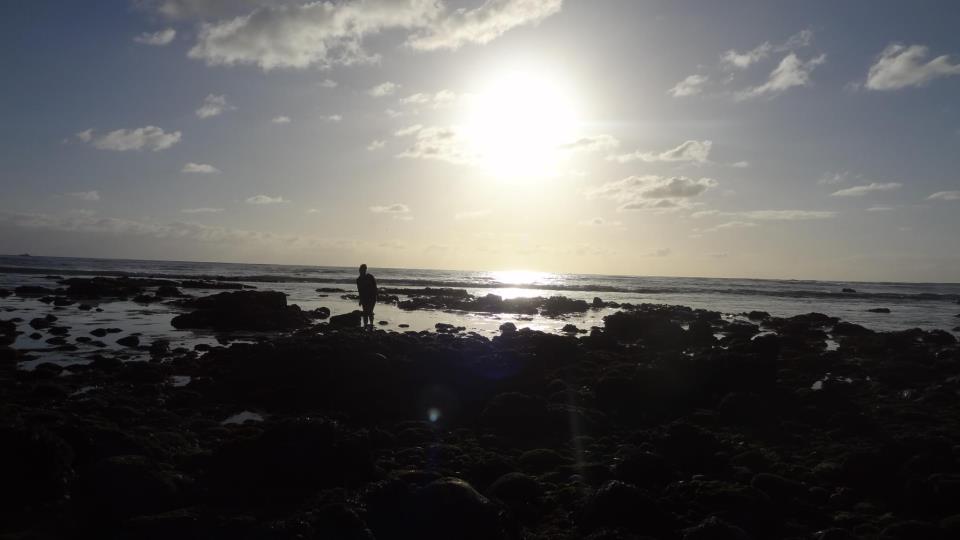



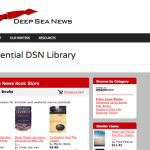

Nice read,
My old man was a dive master and knew some people, so I got PADI certified at age 12 in Bermuda. Great place to learn how to dive. I had to carry all my own gear, My tank and dive belt felt like they weighed a ton. Glad my old man gave me that experience.